- Home
- Antonia Fraser
Cromwell Page 25
Cromwell Read online
Page 25
Alas, time had now run out for this loyal gentleman. Cromwell ordered his artillery to pound away at one side of the stronghold, and on the other Colonel John Dalbier, formerly leader of one of Essex’s cavalry regiments, began an equivalent cannonade. Cromwell had brought with him five “great guns”, two of them demi-cannons (probably 24-pounders) and one whole cannon (48 or 50 pounds) as well as the lesser 16-pound culverins. Already such guns, typical of the New Model’s efficient siege artillery, had shown their worth at earlier assaults: at Sherborne Fairfax’s guns had blown holes in the walls after two days, and more recently at Winchester where according to Hugh Peter, a breach wide enough for thirty men to enter abreast had been made in the space of a day. At Basing House they were no less successful in providing the preliminary harsh prophecy of what was to come. The assault itself was ordered to take place at daybreak on Monday, 14 October. Cromwell spent the night before in prayer, and pondered at length on a text from the H5th Psalm regarding idols, peculiarly suitable to one who expected to take part in much idol wrecking on the morrow: “They that make them are like unto them, so is every one that trusteth them.”31
In the event the storm was brief and bloody, the Catholics refusing utterly to yield, and John, Marquess of Winchester refusing to the last to ask for quarter. He himself was said to have been captured saying his rosary in a bread-oven, while Inigo Jones was carried out stark naked, wrapped in a blanket. One quarter of the garrison was killed, including many noblemen, six Catholic priests and one woman. One dead officer lying on the ground was measured and proved to be nine foot in height or so Hugh Peter told Parliament; perhaps it was a reluctant tribute to the outsize gallantry of the defence. The booty was terrific, and this time Cromwell placed no impediments in the way of his men’s enjoyment of it. The cellar was ransacked, and that too gave much pleasure to the soldiers. The house itself went up in flames, a conflagration which may have started accidentally in the cellars. It was left to the gallant Marquess, still breathing defiance, to cry out as he watched his noble fortress burn that “if the King had no more ground in England but Basing House he would adventure as he did, and so maintain it to the uttermost”. Thus Basing came to be known as Loyalty House; Winchester himself, carried away to imprisonment in the Tower with his two young sons ordered to be brought up as Protestants, was known as the great Loyalist. To Cromwell, however, there was little emotion about the capture of Basing. He had directed operations at a certain remove, since as commanding officer it was not his place to lead the siege (although Denzil Holies subsequently and characteristically accused him of cowardice in cowering “at a great distance off, out of gun-shot behind a hedge”). His recommendation that Basing House should now be knocked down and utterly “slighted” was also based on strategic considerations. Basing House was by this time surrounded by devastated countryside and therefore to garrison Newbury would make much more sense in terms of provisions; in any case the gentlemen of Hampshire and Sussex would contribute far more readily to a garrison on their frontier than “in their bowels”.32
* * *
While Fairfax and Cromwell conducted their wearisome if effective processional of sieges, the political guns at Westminster continued to fire their cannonades with something of the same noise and fury, if less tangible results. By the autumn the Scots, disgruntled ever since Naseby, had reached a firm determination to seek a peace with the King on their own terms. In the second week of October the Scottish Commissioners drew up a list of propositions for his perusal, which merely requested Charles to agree to a Church settlement produced by the Parliaments and Assemblies of the two kingdoms – in short a settlement according to the Presbyterian system. Such a suggestion hardly commended itself to the Independents, who envisaged themselves being contained as a result within the same tight net of alien religious observance which they had previously so much deplored. Indeed, this settlement accorded not at all with the more tolerant Order of Accommodation inspired by Cromwell a year earlier; at the beginning of November the Lords deliberately ordered a renewal of this gesture of concession to “tender consciences”.
Thus by mid-November the Independents had in a manner of speaking fully declared themselves for total liberty of conscience, and the Presbyterians had ranged themselves against it. The issue was however not to be fought out until after the end of the war; this was because continuing military aid from the Scots was essential to any plan from the Independents that involved defeating the King before treating with him. Charles himself continued to negotiate with the Catholic Irish the while, in the course of dalliance with the Scots. An Irish treaty, for all the Papal Nuncio’s dark suspicions of Charles’s good faith, was signed in the autumn, causing equally dark suspicions in the breasts of the Protestant English. Despite such unpleasant complications, once more some sort of general agreement was patched up at Westminster between the two bodies of opinion, and a new set of propositions was put forward to Charles before the end of the year. These were very much framed within the context of the existing social framework of the country: there were to be dukedoms for Puritan peers such as Essex and Warwick, a marquisate for Manchester, earldoms for supporters like Lord Fairfax and a viscountcy for Holies; among the future barons were named not only Thomas Fairfax but Oliver Cromwell. Lavish monetary rewards were also proposed, by which ,Ł2,500 a Year would come Cromwell’s way, Ł1,000 a year for Skippon and Ł5,000 for the Commander-in-Chief Fairfax.
These proposals fell through and the alternative solution of settlement by military victory held the day by default; Cromwell received neither his barony nor his income, although we must assume that both would have been quite as acceptable to him as his dukedom to Essex and his viscountcy to Holies. A more interesting speculation along the lines of what might have been, is that provided by a plan of the Independents current about the same time, to withdraw in a body to Ireland, having presented the King with the New Model Army and the fortresses. As a otion it may have an amazing ring to modern ears, particularly in view of Cromwell’s later record in Ireland. Yet it is perfectly consonant with the strong emigratory tendencies of the early Puritans, a desire to found elsewhere than England the perfect godly State where religion could be freely practised according to the fancy of the individual. Because the spectacle of a New Ireland, parallel with a New England, peopled by Cromwells and Vanes, has such an unreal tinge to our eyes, it need not be supposed to have been a complete chimera of the imagination at the time. Cromwell’s frequent previous gestures in the direction of emigration particularly in moments of religious stress, will be recalled. Now he was reported to be particularly strongly associated with the plan according to Sir Hardress Waller, who discussed the scheme with him. He told Waller that “the spirit leads much that way”, if only to support Munster. Waller even went so far as to suggest that Cromwell might be petitioned for as Lord Deputy of Ireland.33
If the vision of a Puritan Ireland receded from sight, the prospects of economic reward from his military labours were somewhat brighter. Cromwell had continued to campaign with Fairfax in the late autumn of 1645, and after an exceptionally short spell in winter quarters, returned to duty in the West Country in early January. The same month he learned that he had been voted Ł2,500 a year not from the King but from Parliament itself for “his unwearied and faithful services”, with a further Ł500 for the purchase of horses and furniture. There proved to be problems with the actual implementation of the reward, for which it was intended to use the Hampshire estates of the Marquess of Winchester, but in the end was supplemented by other Catholic and’ ‘delinquent’’ properties, including those of the Marquess of Worcester in Wales. Nevertheless it was as well that Cromwell was being bolstered up as a man of material substance, as well as a Parliamentary hero of the wars. He was about to be faced with the traditional expense of any father of a large number of young daughters, never guaranteed to occur at a convenient moment, in the shape of marriage contracts and dowries. It was Cromwell’s favourite Bettie, still only sixteen
, who led the way since Bridget, her elder by six years, was still being courted by Henry Ireton. Bettie’s marriage to the twenty-two-year-old John Claypole of Northamptonshire on 13 January, in Holy Trinity Church, Ely, took place during her father’s absence, although the marriage contract granting her a dowry of Ł1,250 was not signed for a further two months, no doubt for this very reason.34
It is pleasant to deduce from Bettie’s youth and the slight haste of a match which could not wait for her father’s return, that she was in love with her young bridegroom. The Puritan handbooks of the period, full of wise precepts on the subject of family life, are curiously modern in their emphasis on the real need for mutual liking between a young couple in an arranged match, since then “love is like to continue in them for ever as things which are well glued”. The young Claypoles did show every sign thereafter of being “well glued” together. John Claypole was the son of a neighbour and old friend of Oliver Cromwell’s – the Claypoles lived at Northborough, near Peterborough about thirty miles from Ely, and John Claypole senior had been one of those who had refused to pay ship-money. John Claypole, rated by Lucy Hutchinson crossly as a “debauch’d and ungodly cavalier”35 certainly always showed himself attractive to women,* ( * After Bettie’s untimely death, he married again, and at the end of his life his affections were the subject of dispute between this second wife and the laundress with whom he lived.) and if in temperament he was no Henry Ireton, that too was no bad thing to cope with the charming and wayward Bettie, a world away in interests and behaviour from sober Bridget.
Where Bridget worried her father by her religious scruples, Bettie caused him concern by her self-confessed frivolity. Some months after the wedding Oliver was reporting to Bridget that Bettie was “exercised with some perplexed thoughts. She seeks her own vanity and carnal mind, bewailing it; she seeks after (as I hope also) that which will satisfy.” Although we must take Oliver’s word for it that Bettie was making every attempt to remedy her “carnal mind”, enough vanity evidently survived into the Commonwealth period to make her take very easily and gaily to her new and loftier position as the daughter of a great man. But in her father’s view, at any rate, if not always morally perfect, Bettie was always totally beloved. Her slanting eyes, the delicacy of her oval face which somehow managed to contain the strong Cromwell nose and still look appealing, her pretty little rosebud mouth, plentiful brown hair and bright English complexion, all added up to the beloved “Eliza”, described by Marvell as “Nature’s and his Darling”.36
On 8 January 1646 Cromwell assembled his men at Crediton in Devonshire, despite deep snow, in order to take the field against the Royalist General in the West, Sir Ralph Hopton. His first engagement was more farcical than furious: leading a surprise attack on Lord Wentworth’s headquarters at Bovey Tracey, fourteen miles south, he found the Royalist officers happily playing cards. In a scene worthy of Moliere, Cromwell’s troops dived on the stake money, which the Royalists with much presence of mind threw out of the window; in the ensuing scrimmage they themselves escaped easily out of the back door. Nevertheless four hundred horses and one major – presumably less agile than the rest – were captured. Tavistock was stormed six days later. The truth was that even in the West Royalist morale was sinking rapidly, and Fairfax himself wrote to his father that three redcoats would now be able to chase away one hundred of the enemy. Recruits in Devonshire flocked freely to the clearly winning Parliamentary banner at Totnes, where the men had the privilege of being addressed by Cromwell himself. He spoke to them in sanguine terms of the future: “We are come to set you, if possible at liberty from your taskmasters, and by settling Peace, bring Plenty to you again.”37 Peace was certainly approaching apace, if the prospects of plenty were more problematical. Hopton fought bravely on, but even he could not hold out for ever against dwindling supplies and even more rapidly decreasing enthusiasm. On 2 March the Prince of Wales sailed for the Scilly Isles, and on 14 March at Exeter Hopton’s army signed articles of surrender.
Only the capital at Oxford, where the King was cooped up with his younger children and the Princes Rupert and Maurice, retained any significance as a Royalist centre of defiance. Fairfax now sent on an advance guard of horse to threaten it. “Every day”, wrote Clarendon afterwards, “brought the news of the loss of some garrison.” Newark, that baleful threat to the Eastern Association of early days, surrendered at the King’s orders in early May. The remaining fortresses which held out were like isolated sandcastles from which the sea had receded. The scene had shifted in earnest to Westminster. It was here that Cromwell returned on 22 April in order to report back to the House of Commons the details of Hopton’s surrender. The next day he was duly thanked by the whole House for his efforts on their behalf. But the political strains which were now to make themselves felt in all the complex possibilities of peace what sort of peace? on whose terms? and to whose benefit? – were indicated by his next move. On 24 April Henry Ireton passed on to Cromwell a letter which gave evidence of the King’s desire to treat with the Army. Cromwell immediately denounced Ireton in the House of Commons for having sent the letter to him privately, and read aloud the offending document. It was as though Cromwell deliberately seized the opportunity to emphasize the loyalty of the Army, which would not permit them to indulge in even the mildest double-dealing behind the back of Parliament. The fact that Henry Ireton was well known to be his close personal friend – and the marriage contract with his daughter was actually signed on the same date as the denunciation – only served to emphasize Cromwell’s point the more.38 Cromwell the politician was certainly beginning to take over from Cromwell the soldier.
Nevertheless in the minds of his own party generally, and even more so in the minds of those men who had served under him, it was as a magnificent General in the field rather than an effective orator and negotiator at Westminster that Cromwell was regarded by the end of the Civil War. Purely politically, he was not yet strikingly prominent, particularly as he had been absent for so long on the warfront during the past few years. Yet his military reputation even among civilians was enormous, not the least because he was popularly believed to have been responsible for those great victories which demonstrated the favour of the Lord: “Where is the God of Marston Moor and Naseby? is an acceptable expostulation in a gloomy day,” said John Owen, Cromwell’s chaplain, later.39 It was good to be identified with such glorious pieces of Providence.
His own men were obviously not backward in sharing in this general warmth, and indeed much of Cromwell’s subsequent influence over the turbulent spirits of the Army is impossible to understand, without taking into account the position he had achieved in their estimation by the end of this phase of the war. As well as a masterly grasp of battle tactics, Cromwell had all the rough magic which is needed to turn a brilliant General into a great leader of men. In some ways Cromwell among his men was a larger-than-life character who naturally embodied their own passions and even jokes. We know that he loved “an innocent jest” and even on his way to the crucial encounter of Dunbar stopped to laugh at the sight of soldiers larking with a full cream-tub, which one was sticking over the head of another. His soldiers had their musical marches, not only the chanted Psalms, as warriors have always done. When his men sat with their tobacco, their fife-recorders and their citterns, enjoying their campfire songs – considered by some Puritans to be bawdy, and no doubt they were – Oliver was prepared to be tolerant. An argument developed between a Captain and his Colonel on the subject of one such song beginning innocuously enough “There dwells a pretty maid, her name is Sis”; the soldier defended himself artlessly on the grounds that he sang “merely for the music’s sake”. It was Oliver, at the type of court martial which followed, who proposed the common-sense solution to the quarrel: Colonel and Captain were forthwith to be parted.40
Such a capacity for identification and sympathy with the amusements and pleasures of ordinary men was turned to good account of popularity and loyalty. Certainly nothing could h
ave been further from Cromwell’s “familiar rustic affected carriage” amongst his soldiers, sporting with them where the mood took him, than the traditional dour image of the Puritan killjoy, preaching his men into battle. It was not of course that his tolerance ever extended to slackness: there was a revealing anecdote told later of Cromwell and Ireton being stopped by their own guards, whose captain at first refused to believe them when they gave their names. Ireton was a little angry, but Oliver cheerfully commended the men for doing their duty and gave them 20s. The soldiers afterwards confessed that they had known all the time the identity of these “great men”, and had been determined to show themselves more strict, under the impression that Cromwell was probably checking up on them.41 Cromwell knew his men – and the men their Cromwell.
As for the immense exhilaration, of the type which used to seize Cromwell as he rode forward on his charges, that was described by Richard Baxter in terms which suggested in modern parlance a streak of the manic: “He was naturally of such a vivacity, hilarity and alacrity,” he wrote, “as another man is when he hath drunken a cup of wine too much.” Such enthusiasm was contagious. It was exciting to ride with the New Model buff-coats and all to charge into battle with your pike shouting “God and our Strength”, to beat down garrison after garrison and in the end, secure in the possession of victory, to feel that strength had been rewarded. Last of all, you repaid your General with your admiration and even your love. He in turn, wrote Carrington, also “loved his soldiers as his children, and his greatest care was to see them provided for with all necessaries requisite.”42 Real affection did exist between Cromwell and his soldiers. The coming year would test its quality.

 Warrior Queens
Warrior Queens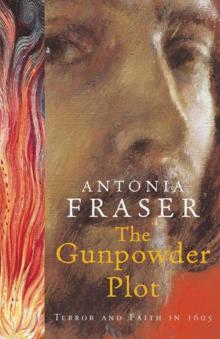 The Gunpowder Plot
The Gunpowder Plot Cromwell
Cromwell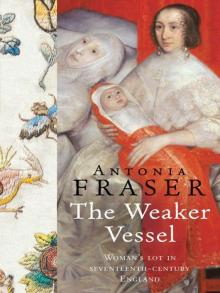 The Weaker Vessel: Women's Lot in Seventeenth-Century England
The Weaker Vessel: Women's Lot in Seventeenth-Century England Marie Antoinette: The Journey
Marie Antoinette: The Journey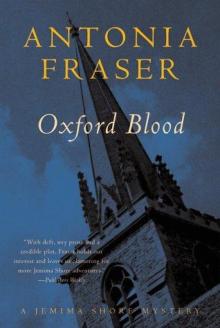 Oxford Blood
Oxford Blood Your Royal Hostage
Your Royal Hostage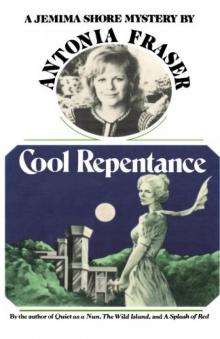 Cool Repentance
Cool Repentance Mary Queen of Scots
Mary Queen of Scots Political Death
Political Death Royal Charles: Charles II and the Restoration
Royal Charles: Charles II and the Restoration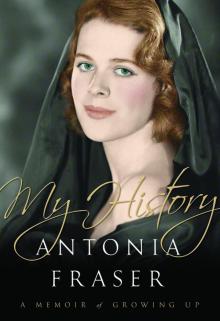 My History: A Memoir of Growing Up
My History: A Memoir of Growing Up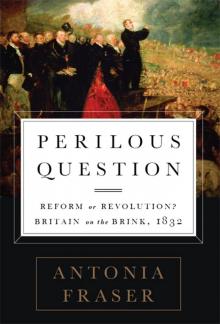 Perilous Question: Reform or Revolution? Britain on the Brink, 1832
Perilous Question: Reform or Revolution? Britain on the Brink, 1832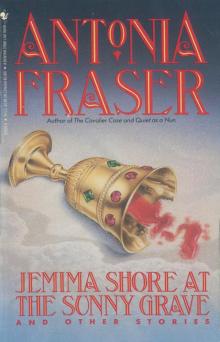 Jemima Shore at the Sunny Grave
Jemima Shore at the Sunny Grave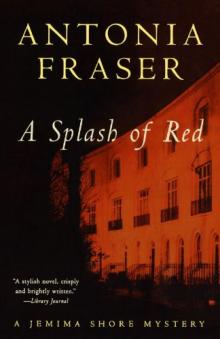 A Splash of Red
A Splash of Red Must You Go?: My Life With Harold Pinter
Must You Go?: My Life With Harold Pinter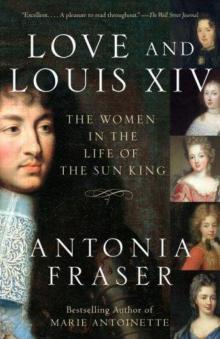 Love and Louis XIV: The Women in the Life of the Sun King
Love and Louis XIV: The Women in the Life of the Sun King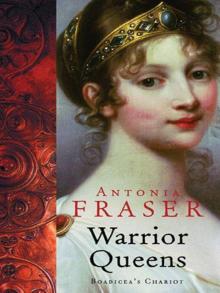 The Warrior Queens
The Warrior Queens The Wild Island
The Wild Island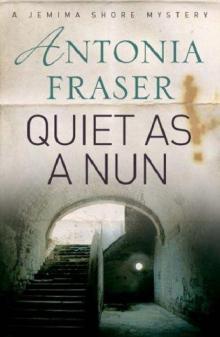 Quiet as a Nun
Quiet as a Nun Perilous Question
Perilous Question Cromwell, the Lord Protector
Cromwell, the Lord Protector Gunpowder Plots
Gunpowder Plots The Wild Island - Jemima Shore 02
The Wild Island - Jemima Shore 02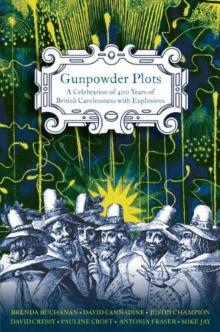 Gunpowder Plots: A Celebration of 400 Years of Bonfire Night
Gunpowder Plots: A Celebration of 400 Years of Bonfire Night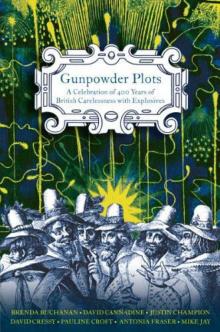 Gunpowder Plots_A Celebration of 400 Years of Bonfire Night
Gunpowder Plots_A Celebration of 400 Years of Bonfire Night Marie Antoinette
Marie Antoinette Must You Go?
Must You Go?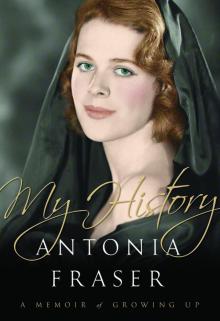 My History
My History